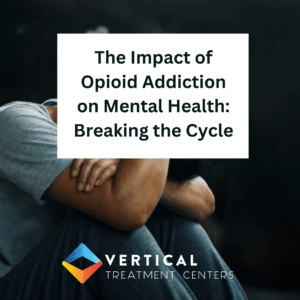
The Impact of Opioid Addiction on Mental Health: Breaking the Cycle
Opioid addiction is a complex issue that not only affects physical health but also has a significant impact on mental well-being. The relationship between opioid addiction and mental health is intertwined, with addiction often leading to the development or exacerbation of mental health disorders. In this blog post, we will explore the profound impact of opioid addiction on mental health and discuss the importance of addressing both aspects in a comprehensive treatment approach.
Opioid Addiction and Co-occurring Mental Health Disorders
Opioid addiction frequently co-occurs with mental health disorders such as depression, anxiety, and post-traumatic stress disorder (PTSD). Individuals may turn to opioids as a means of self-medication to cope with underlying mental health issues. However, the temporary relief provided by opioids can quickly develop into a vicious cycle, worsening mental health symptoms and perpetuating addiction.
The Dual Diagnosis Challenge
The presence of both opioid addiction and a mental health disorder is known as a dual diagnosis or co-occurring disorder. Treating dual diagnosis cases requires a comprehensive approach that addresses both the addiction and the mental health disorder simultaneously. Without simultaneous treatment, the untreated mental health condition can undermine recovery efforts and vice versa.
Impact of Opioid Addiction on Mental Health
- Chemical Imbalances: Prolonged opioid use disrupts the brain’s natural chemistry, leading to imbalances in neurotransmitters responsible for regulating mood, emotions, and overall mental well-being.
- Increased Risk of Mental Health Disorders: Opioid addiction dramatically increases the risk of developing mental health disorders, such as depression and anxiety. The ongoing cycle of opioid use, withdrawal, and desperation further exacerbates these conditions.
- Mental Health Symptoms Intensification: Opioid addiction can intensify the symptoms of existing mental health disorders, making them more challenging to manage. This can lead to a worsening of symptoms, decreased functioning, and increased risk of self-harm or suicide.
Addressing Opioid Addiction and Mental Health Concurrently
The treatment of opioid addiction and mental health disorders should go hand-in-hand to promote successful recovery and improved overall well-being.
- Integrated Treatment Approach: Integrated treatment involves a coordinated approach that combines addiction treatment, mental health counseling, medication (if necessary), and ongoing support. This approach acknowledges the interplay between addiction and mental health and ensures a comprehensive approach to address both.
- Dual Diagnosis Treatment Programs: Specialized dual diagnosis treatment programs are designed to meet the unique needs of individuals with co-occurring disorders. These programs offer tailored therapies, support groups, and psychiatric care to address addiction and mental health in tandem.
- Holistic Therapies: Holistic approaches like mindfulness meditation, yoga, art therapy, and exercise can complement traditional treatment methods. These activities promote overall mental well-being, reduce stress, and improve mood.
The Importance of Long-term Support
Recovery from opioid addiction and the management of mental health disorders require ongoing support and aftercare. Long-term support systems, such as counseling, support groups, and relapse prevention programs, are crucial for maintaining sobriety and managing mental health symptoms.
Conclusion
Opioid addiction not only affects physical health but can also have a devastating impact on mental well-being. It is vital to address both addiction and mental health concurrently to break the cycle and promote lasting recovery. Integrated treatment approaches, specialized dual diagnosis programs, and holistic therapies can provide individuals with the comprehensive support needed to heal their minds and bodies.